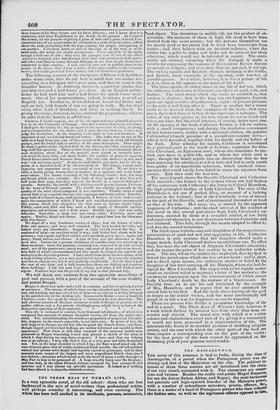THE THREE ERAS OF WOMAN'S LIFE,
Is a very agreeable novel, of the old school : those who are less hackneyed in the arts of novel-writers than professional critics, will perhaps consider it interesting, and even exciting. The whole has been well studied in its incidents, persons, connexion, *and object. The characters in middle life are the-product of ob- servation: the manners of those in high life seem to have been derived from the sante source ; but the persons themselves are too purely good or too purely bad to have been transcripts from nature ; and they behave with an insolent rudeness, when the author has a point to make and lacks art to carry on her story otherwise, Which would not be tolerated in society. The senti- ments are natural, excepting when the dialogue is made a vehicle for expressing the opinions of ELIZABETH ELTON SMITH on morals or religion; and even then they are are just, if not apt. '1 ho style is equable and finished ; though inclining to the feeble, and dashed, more especially in the opening, with touches of grandilequeoce. As a whole, however, it is less a picture of life as it is, than as life appears to the mind of the writer.
The three epochs, or rather states in the life of her sex, which the authoress endeavours to illustrate, are those of maid, wife, and mother. The main moral which she seeks to establish is, that conduct is destiny ; that in the long run our happiness depends upon our rigid sacrifice of inclination to right—of present pleasure to the evils it will bring after it. There is another but a minor truth to be derived front the examples of the book—that none marry their first love, or if they do the marriage is unhappy. The ladies of any consequence in the tale, whom we see as maids and wives, arc four; but the chief interest, of course, turns upon one. At the opening of the book, Catherine Vernon is left au orphan, with a small competence; and duriug the desolation consequent on her bereavement, resides with a maternal relation, the popular Calvinistical Church preacher of a second-rate country town,— who is well described, together with his family and the habits of the flock. Alter refusing his curate, Catherine is introduced by a paternal aunt to the world of fashion ; captivates Sir Gre• ville Cleveland, an Epicurean roue, whom she stimulates to em- bark once more in public life, and in whom her whole soul is rapt; though she firmly rejects him on discovering that he has been renewing his attentions to a first love, and had in early youth been guilty of an improbable seduction, which involved conse- quences that could hardly have failed to cause his rejection from society. And thus ends the first (era. The second epoch shows Sir Greville Cleveland and Catherine both married,—the former to the woman whose arts had broken off his connexion with Catherine; the latter to Colonel Hamilton, the high-principled brother of Lady Cleveland. The state of the llamiltons is not one of perfect bliss, on account of a lurking jealousy in the Colonel ; that of the Clevelands is one of misery on the part of Sir Greville, and of matrimonial discomfort at least on that of his wife. Her envy, too, is roused by the apparent happiness of Catherine : and the chief interest of the conduct of the novel in this second part arises from Lady Cleveland's en- deavours, assisted by those of a so-called satirist, of low birth and equivocal character, to sow dissension between Catherine and her husband. This fails, through the means adopted to effect it; and sera the second terminates.
The third opens with the sons and daughters of the respective re- presentatives of good and evil just appearing in life. Catherine Hamilton is only anxious that her daughter should make a happy match. Lady Cleveland desires an ambitious one. To effect this, has been the sole object of Augusta Cleveland's education; and she repays the pains of her mother by an undutiful selfish- ness. The son, whom the mother has neglected, does his ;lest to thwart the match upon which she has set her heart : mune §hort, not to dwell upon means, the ambitious mother is foiled ty the daughter of her rival carrying off the Marquis, whom she had de- signed for Miss Cleveland. She elopes with (if we rightly under- stand an incident veiled in mystery) a lover of her mothers; the excitement consequent upon the announcement of which causes Lady Cleveland's death by the rupture of a blood-vessel. Sir Greville lives on to see his son reclaimed by the example of Mrs. Hamilton, and to regret that he ever sacrificed his second love to his first. And the book closes leaving all the good as happy as the reader wishes, and the more intellectually bad people in as fair a way for happiness as can be expected.
There are persons who dislike a premature knowledge of the end of a novel. The Three Eras of Ifianan's Life, however, is a work which derives its interest less from story than from ex- ecution and objects. The moral aim with which it is written colours and characterizes every part of it; giving it a consistency it would not have possessed as a representation of life. The miniature-like finish of its truthful pictures of middling religious society, and the care with which the other parts of the book are done, require a corresponding care on the part of the reader; for the best points of the book cannot be appreciated on the skimming plan of your genuine novel-reader.


























 Previous page
Previous page